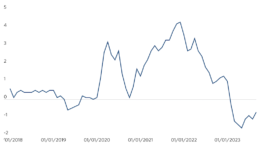The Future of Freight: Embracing Scheduling Standards in Transportation
Scheduling Standards Consortium: Gateway to Automation.

Operational Efficiency: A Survival Imperative for Carriers and Brokers.
As the freight demand gradually stabilizes, the transportation industry adapts to a new normal characterized by lower freight rates, escalating wage inflation, and increasing interest rates. This combination of factors has culminated in a challenging environment with shrinking profit margins. In response, carriers and brokers are intensifying their efforts to enhance operational efficiency and pursue automation of workflows wherever feasible. Amidst these efforts, the development and implementation of robust scheduling standards have emerged as a critical area of focus.
High Cost of Manual Appointment Scheduling in Logistics
Appointment scheduling, a highly manual and time-consuming workflow, represents a significant operating cost directly impacting profit margins. Fragmented scheduling methods, manual interventions, and the need for frequent adjustments further complicate this process. Such inefficiencies create friction among carriers, shippers, and brokers, exacerbating operational costs.
The absence of standardized data and processes worsens appointment scheduling inefficiency. This slows down the development of automated workflows and the gathering of useful insights needed for smart decision-making. This leads to direct financial costs and hinders efficiency and profitability improvements through data-driven methods.
Considering the difficulties, industry leaders such as BiggerPicture are stepping up to offer innovative solutions to overcome these hurdles. BiggerPicture, known for its advanced appointment scheduling technology, is working towards simplifying and unifying these complex processes. The Scheduling Standards Consortium (SSC) has also introduced the standardization of scheduling APIs.
The Scheduling Standards Consortium: Facilitating Integration and Efficiency
The Scheduling Standards Consortium (SSC) was established in 2022 to simplify system integration in the logistics industry, simplify appointment scheduling, and help transform Operational efficiencies. Initially founded by Convoy, Uber Freight, and J.B. Hunt, the SSC has grown to include 16 key industry players and garnered interest from 800 additional companies.
The Gateway to Streamlined Scheduling
This past month, the consortium published its technical API standard to enable companies to access up-to-date data. This can help them make informed scheduling decisions to enhance efficiency, reduce waste, lower costs, and improve service outcomes.
Appointment Scheduling solutions, along with TMS, are the sources of truth regarding appointment capacity and constraints. So, to simplify scheduling, the SSC requires these solutions to respect the following:
- Execute necessary rules and validations for appointment bookings.
- Provide a way for carriers and brokers to pass information to uniquely identify a load or a stop, such as the BOL or PO#.
- Fetch a list of available appointment times & appointment details for a particular load on a particular day at a particular stop.
- Schedule and reschedule available appointment times for a particular load on a particular day at a particular stop.
- Cancel existing appointment(s) and any outstanding pending requests against the canceled appointments.
- Control webhook event subscriptions when receiving asynchronous information through webhooks.
Effect on the Broad Industry
Reshaping Large Enterprise Operations
The SSC comprises major enterprise freight brokers and shippers’ TMS partners. These large enterprise brokers stand to gain from streamlining the labor-intensive appointment booking processes with the TMS participants. They acknowledge that scheduling expenses are substantial, and this represents the most effective approach to cutting overhead costs and protecting their profit margins. Over the last five years, large enterprise brokers have invested significantly in their TMS technology, with APIs at the forefront. Most notably, J.B Hunt invested $500M into their technology and Uber Freight’s $120M in their TMS.
While the SSC’s initiatives mark significant progress, they also reveal unique challenges for smaller and mid-sized industry players.
Challenges for Smaller Players: Bridging the Technology Gap
Scheduling APIs offers a significant edge to larger companies. They present considerable challenges for smaller and mid-sized businesses, especially shippers and freight brokers. These smaller entities often lack the resources to invest in Transportation Management Systems (TMS) that adhere to the standardized protocols of the SSC. This limitation restricts their ability to utilize automation effectively, diminishing their opportunities to reduce operational costs. As a result, these businesses face a competitive disadvantage in a technology-centric market.
This disparity is evident when considering that about 70% of facilities still use email for appointment scheduling, highlighting the need for these smaller players to access automation tools and efficiency improvements. Moreover, their inclusion and advancement in the ecosystem are essential to having a greater impact on the overall network’s efficiency. In response to these varied challenges and the emerging standards set by the SSC, companies like BiggerPicture are leading the way in providing comprehensive solutions.
Access for All: Towards Comprehensive Unified Scheduling
Introducing an API standard marks a step forward in simplifying the connectivity between carrier TMS solutions and shipper scheduling systems. However, this standard will initially cover less than 20% of available appointments, leaving a substantial portion managed through varied and often manual methods, including emails and non-API integrated portals. The industry requires a more holistic scheduling solution, consolidating diverse scheduling methods into a single, streamlined process to enhance scheduling efficiency and accuracy.
That’s precisely what BiggerPicture’s Centralized Scheduling Hub offers. As a leader in appointment scheduling technology within the transportation service sector, BiggerPicture is pioneering the way toward universal scheduling accessibility. Understanding the current fragmented state, BiggerPicture has developed a comprehensive solution integrating various scheduling approaches into one unified system. This system accommodates diverse scheduling workflows and introduces smarter practices, such as appointment recommendations for end-to-end scheduling. BiggerPicture is committed to redefining appointment scheduling, making it more efficient and accessible for the entire supply chain network.
Book a demo today!




